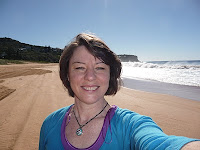  |
Kate Crowe (centre) with her supervisors
Prof. Sharynne McLeod and Dr. Teresa Ching |
On Friday 7th May Kate Crowe, my PhD student presented her endorsement of candidature session at Australian Hearing in Chatswood, Sydney. Her PhD is titled
Multilingual children with hearing loss: Communcation choices and outcomes.
Here is her synposis:
Children with hearing loss often have difficulty acquiring language due to their reduced ability to perceive spoken language (McConkey Robbins, Green, & Waltzman, 2004). Caregivers of children with a hearing loss must make decisions regarding their child’s communication mode (e.g., oral, manual or mixed communication) at very early stages in their child’s development, and re-evaluate these decisions as their child develops (Wheeler, Archbold, Hardie, & Watson, 2009). Caregivers from multilingual families or families where the preferred language is not the dominant community language, must also decide which language or languages they will use with their child (Waltzman, McConkey Robbins, Green, & Cohen, 2003). This situation leads to four areas of investigation explored in this thesis, all of which have been relatively unexplored in the literature to date. Firstly, what is the demography of communication mode and language use of children with hearing loss? Secondly, which factors do caregivers consider when making decisions about communication mode and language use for their child with a hearing loss? Thirdly, which factors do professionals consider important when advising the caregivers of children with hearing loss about communication mode and language use choices? Finally, what are the speech, language and participation outcomes of children with hearing loss in terms of the impact of different language use options? The information gained from these investigations will assist caregivers and professionals in understanding how decisions about communication mode and language use are made and the possible impact of these decisions on the speech, language and participation of children with hearing loss. Results will be discussed in the framework of the World Health Organization’s International Classification of Functioning, Disability and Health - Children and Youth (ICF-CY, World Health Organization, 2007b), making findings accessible to health and education professionals internationally.



























